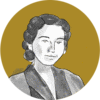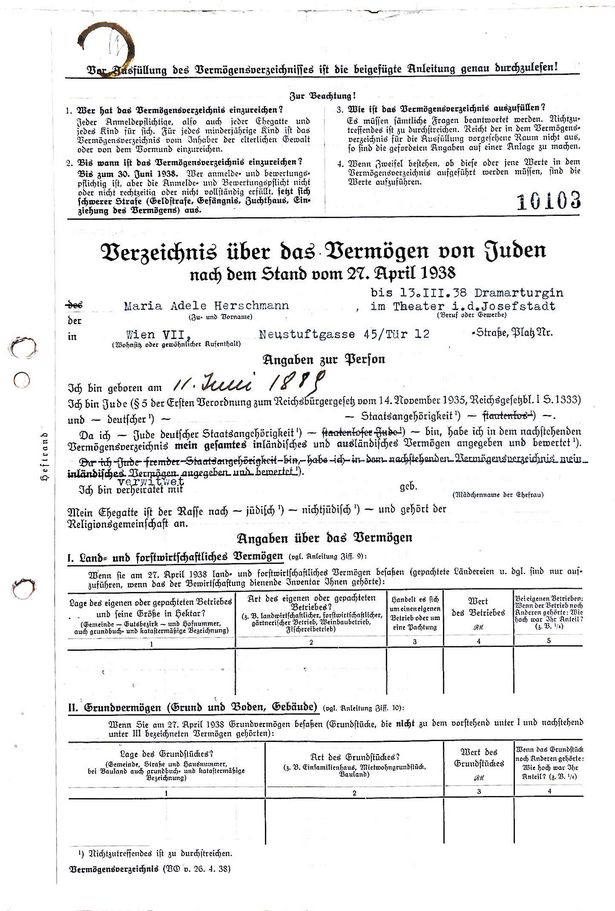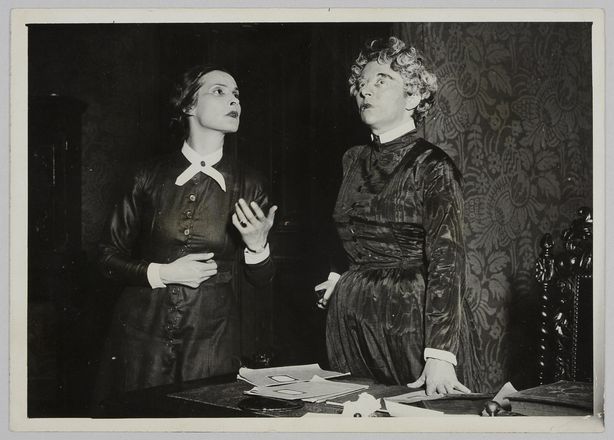Vienna, 26 September 1929
ENGAGED AND EMANCIPATED
Maria Gutmann Celebrates Success as a Theatre Director
A portrait by our reporter Magdalena Knor
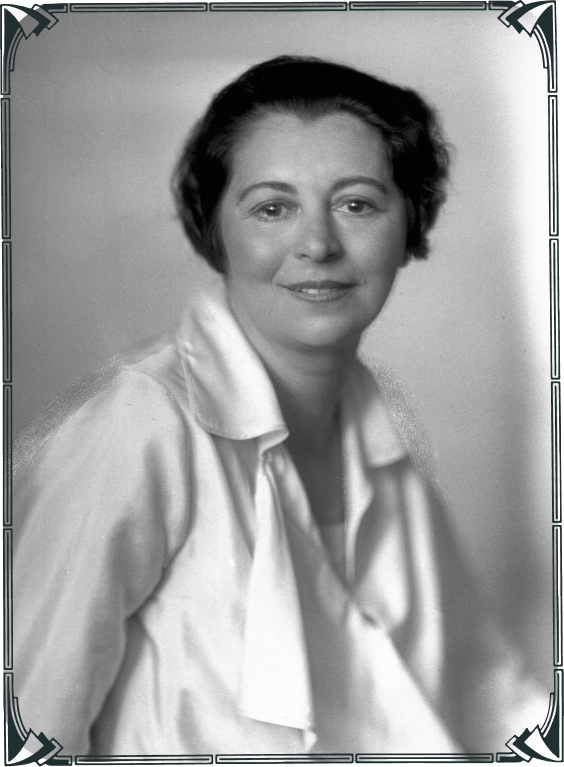
Source: ANNO/Austrian National Library
She is well-known in the local scene and indispensable to the world of theatre: Maria Gutmann is a fixture on the Viennese stage. After shining in various roles as an actress, she does the same now behind the scenes as the first Austrian female director!
We walked through her neighbourhoods of Spittelberg, Siebensternviertel, and Laudonviertel, where she shared her theatrical journey, her experience of her recent thirtieth birthday, and her plans for the near future.
It All Started with Ease
It all began in Graz, where, at the age of 19, she stood on a theatre stage as an actress for the first time. Gifted with talent, enthusiasm, and a penchant for fun, Gutmann soon found herself in Vienna, where she quickly secured roles as an actress at the Raimund Theater and the Deutsches Volkstheater.
Gutmann narrates her journey behind the theatre stage with ease: she gained increasing trust after having to spontaneously and successfully stage a Goethe play under director Dr. Rudolf Beer. With minimal effort, she turned it into a ‘light, farcical comedy’, and soon she discovered her passion for directing. Over time, Gutmann acquired both theoretical and practical knowledge and developed her own personal style.
According to Gutmann, you gradually develop a sense of what each play requires in terms of direction. This feeling also guided her in staging Revolte im Erziehungshaus (‘Revolt in the Reformatory’), the play with which she officially made her directorial debut: ‘[...] natural, unpretentious, and devoid of any intellectualism in the performance’. Once again, Gutmann's penchant for lightness proved successful.
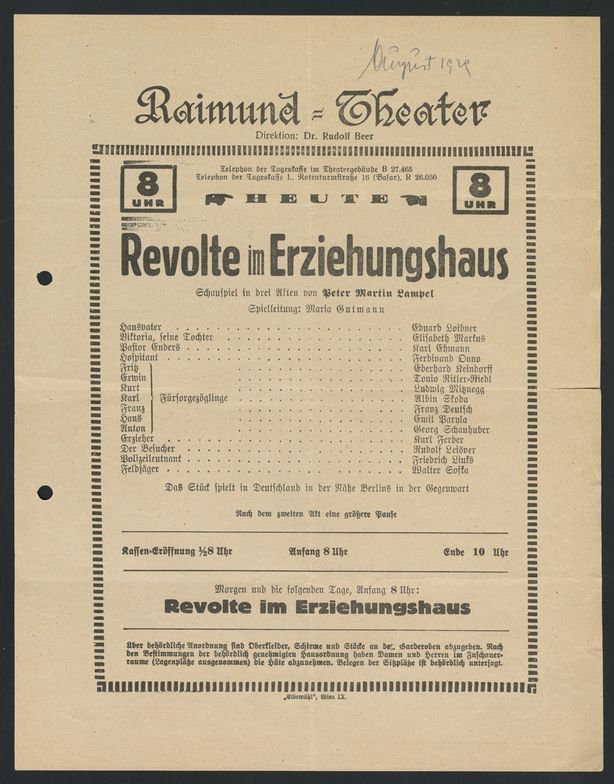
© KHM-Museumsverband
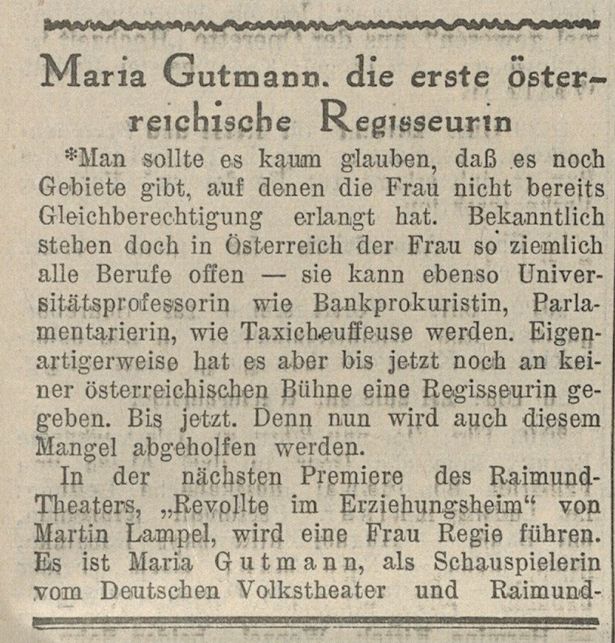
Source: ANNO/Austrian National Library
A Spirited and Empowered Figure
Maria Gutmann exudes dedication that is neither self-sacrificing nor selfish – she is assertive and aware of her potential, just like those around her.
On the occasion of her recent 30th birthday, we extend our belated congratulations! She received a personalized woodcut from her fellow artist Otto Rudolf Schatz and the architect Franz Schacherl. The woodcut is dedicated to her, celebrating her personality, energy, and multifaceted contributions to the theatre. Allow us to share this poem with our dear readers:
g
FOR MARIA GUTMANN ON HER BIRTHDAY, JUNE 11, 1929. / MARIA FULL OF GRACE, YOU SACRED ONE / YOUR LIFE IS LIKE A SPIRAL / NEVER RESTING IN SWING AND ENERGY / LIKE THE PASSION OF A ZEBRA / YOUR TEMPO IS MADNESS, A HORN OF PLENTY OF NATURE / THE SNAIL GOES ON FOOT, YOU ONLY TRAVEL BY CAR / THE THOUSAND-FOLD LIFE, LOVE – GUILT AND ATONEMENT / YOU HAVE GIVEN YOURSELF TO THE WHOLE WORLD – AND TO THE STAGE / STRONG LUNGS, STRENGTH, AND VIGOR PROTECT YOU FROM APICITIS / ONLY ONE DISEASE SOME CURSE, YOUR TELEPHONITIS / THE DAY IS MUCH TOO SHORT, TIME RAPIDLY SLIPS AWAY / BUT YOU DO SO MUCH, NOT ONLY ON THIS OCCASION / YOUR ENTHUSIASM SWEEPS AWAY THE CHATTERING CHILDREN OF SPEECH CHOIRS / MOUTH AND BRAIN – AS WELL AS HEARTS – ARE NOT LESSER / DIRECTING IS EVERYTHING! – AS YOU ORGANIZE IT, SO IT TURNS OUT / AND IN THE EVENING, THERE’S REVOLT IN THE REFORMATORY / MARIA, STAY WITH US / THE ARCHITECTS, POETS, AND PAINTERS SEARCH FOR A PLACE / IN THE WARM FOLDS OF YOUR HEART / FRANCISCUS SCHA. AND OTTO RUDOLF SCHATZ
Furthermore, Gutmann is not concerned about growing older – quite the opposite: She looks forward to her continued work at the Raimund Theater and the Deutsches Volkstheater. She revealed that she will soon take on the role of head of productions for children’s plays at the latter.
Her commitment to Vienna’s Social Democratic Art Office continues, where she supports the Studio Stage – The Young Stage, dedicated to nurturing young artists and producing socially relevant and socially engaged theatre. We wish her the best of luck in all her endeavours!
‘How does one become a director, you want to know? [...] It happened gradually and initially not according to a proper plan.’
n
Maria Gutmann, 1929
Maria Gutmann
born 11 June 1889, Graz
died 19 February, 1963 Zurich
Biography
Maria Adele Gutmann was born on 11 June 1889, in Graz, and was also known by the surnames Guttmann, Horch, and Hershman. The Austrian stage actress and dramaturge was one of the few women working in the theatre during the interwar period.
Gutmann made her acting debut in 1908 in Graz, where she was residing at the time. Between the wars, she established herself as a director, making her the first Austrian female director ever. Later, she worked as an actress in Vienna, from 1922 to 1926 at the Raimund Theater, where she also made her directorial debut in 1929. In the 1926/27 season, and from 1929 to 1934, she worked at the Deutsches Volkstheater, where she served as the head of productions for children’s plays for the 1932/33 season. Gutmann frequently moved within Vienna but remained loyal to her neighbourhoods: Spittelberg, Siebensternviertel, and Laudonviertel.
She was involved with the Social Democratic Art Office in Vienna, which supported the Studio Stage – The Young Stage, a talent pool for emerging artists. There, she aimed to create socially relevant and socially engaged theatre, contrary to the conventions of classical cultural institutions at the time. After Austria’s Anschluss (‘annexation’) to the Third Reich, Gutmann initially emigrated to France, and then to the United States, where she settled in New York under the name Maria Hershman and became actively involved in the theatre scene in various ways. In 1945, she married author and dramaturge Franz Jakob Horch (1901–1951), with whom she ran Horch’s Literary Agency, representing renowned authors including Thomas Mann, John Dos Passos, Arthur Schnitzler, Robert Musil, J.D. Salinger, Upton Sinclair, Max Reinhardt, Franz Werfel, and Klaus Mann.
Gutmann took her husband’s name and became known as Maria Horch. After obtaining American citizenship in 1946, she returned to Europe regularly, especially after Franz Horch’s death. Maria Gutmann passed away on 19 February 1963, due to the effects of a stroke, at the Hirslanden Clinic in Zurich.
What remains?
k
g
Maria Gutmann passed away on 19 February 1963, as a result of a stroke at the Hirslanden Clinic in Zurich. While her biography was marked by successes and tumultuous times, she has unjustly faded into obscurity in contemporary times.
One success initially followed another as Maria Gutmann contributed to and worked within the theatre scene in Vienna. In 1936, the first attacks were launched against her artistic and politically left-leaning work, as well as her involvement in Austria’s social democratic youth organization. With the Anschluss of Austria to the Third Reich in March 1938, Gutmann was forced into exile, signing the wealth declaration under an alternate spelling of the last name she was using at the time – Herschmann – on 15 July 1938, preceding the ‘Jewish Property Tax’ in the following year.
She found temporary refuge in France.
g
Due to the advance of the Wehrmacht, she settled in New York at the end of 1940, now officially known as Maria Hershman, where she continued her work in the theatre industry. After her marriage, the theatre artist, ultimately known as Horch, acquired American citizenship in 1946. With the end of the war, she returned to Europe for the first time and regularly afterward, following the death of Franz Horch.
It's almost as if Maria Horch herself sensed the potential in New York, a city vastly different from the ones she had known until then – Graz, Vienna, and Paris. What she embarked upon promised not only success but was also characterized by her unwavering loyalty. Correspondences between theatre colleagues, friends, and authors she represented internationally were marked by a consistently familiar tone. Even after the war, she did not turn her back on the shattered Central Europe and remained true to her roots.
Maria Gutmann, Maria Hershman, Maria Horch: behind all these names was one and the same person, albeit in different roles and professions. This is a call to not make the mistake of letting her slip into obscurity once more but rather to remember her in all her facets, with a lightness reminiscent of the one she carried and radiated in her time.


